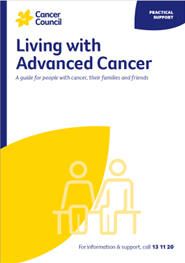- Home
- Secondary liver cancer
- Living with secondary liver cancer
Living with secondary liver cancer
Some people diagnosed with secondary liver cancer can feel well and have periods of time without symptoms. But the uncertainty of living with cancer that cannot be cured can leave you feeling emotionally up and down. At times, you may feel overcome by fear, anxiety, sadness or anger.
Your doctor, nurses, a social worker or counsellor can help you and your family find ways to cope with how you are feeling.
For more on this see Advanced cancer, or listen to our podcast series for people affected by advanced cancer.
Learn more about:
Follow-up appointments
When a follow-up appointment or test is approaching, many people find that they think more about the cancer and may feel anxious. Talk to your treatment team or call Cancer Council 13 11 20 if you are finding it hard to manage this anxiety.
Between follow-up appointments, let your doctor know immediately of any symptoms or health problems.
Dealing with feelings of sadness
If you have continued feelings of sadness, have trouble getting up in the morning or have lost motivation to do things that previously gave you pleasure, you may be experiencing depression. This is quite common among people who have had cancer.
Talk to your GP, as counselling or medication – even for a short time – may help. Some people can get a Medicare rebate for sessions with a psychologist. Ask your doctor if you are eligible. Cancer Council may also run a counselling program in your area.
For information about coping with depression and anxiety, call Beyond Blue on 1300 22 46 36. For 24-hour crisis support, call Lifeline 13 11 14.
The Thing About Advanced Cancer podcast
Listen to our podcast The Thing About Advanced Cancer for information and insights that can help you navigate through the challenges of living with advanced cancer.
Looking after yourself
Cancer can cause physical and emotional strain, so it’s important to look after your wellbeing. Cancer Council has free booklets and programs to help you during and after treatment.
Call 13 11 20 to find out more, or see Managing cancer side effects, Exercise after a cancer diagnosis, Complementary therapies, Emotions and cancer, Nutrition and cancer, Sexuality, intimacy and cancer, Fertility and cancer, and Living well after cancer.
Complementary therapies
These therapies are used alongside conventional medical treatments. Therapies such as massage, relaxation and acupuncture can increase your sense of control, decrease stress and anxiety, and improve your mood. Let your doctor know about any therapies you are using or thinking about trying, as some may not be safe or evidence-based.
There is still a life to be lived and pleasures to be found and disappointments to be had. Living with advanced cancer is a different life, not just a journey towards death.
Julie
Alternative therapies are therapies used instead of conventional medical treatments. These are unlikely to be scientifically tested and may prevent successful treatment of the cancer. Cancer Council does not recommend the use of alternative therapies as a cancer treatment.
Podcast for people affected by advanced cancer
Listen now
More resources
Prof Desmond Yip, Senior Staff Specialist, Department of Medical Oncology, The Canberra Hospital, ACT (clinical update); A/Prof Siddhartha Baxi, Radiation Oncologist and Medical Director, GenesisCare, Gold Coast, QLD; Prof Katherine Clark, Clinical Director of Palliative Care, NSLHD Supportive and Palliative Care Network, Northern Sydney Cancer Centre, Royal North Shore Hospital, NSW; Anne Dowling, Hepatoma Clinical Nurse Consultant and Liver Transplant Coordinator, Austin Health, VIC; A/Prof Koroush Haghighi, Liver, Pancreas and Upper Gastrointestinal Surgeon, Prince of Wales and St Vincent’s Hospitals, NSW; Karen Hall, 13 11 20 Consultant, Cancer Council SA; Dr Brett Knowles, Hepato-Pancreato-Biliary and General Surgeon, Royal Melbourne Hospital, Peter MacCallum Cancer Centre and St Vincent’s Hospital, VIC; Lina Sharma, Consumer; A/Prof Simone Strasser, Head of Department and Hepatologist, AW Morrow Gastroenterology and Liver Centre, Royal Prince Alfred Hospital and The University of Sydney, NSW; David Thomas, Consumer.
View the Cancer Council NSW editorial policy.
View all publications or call 13 11 20 for free printed copies.

